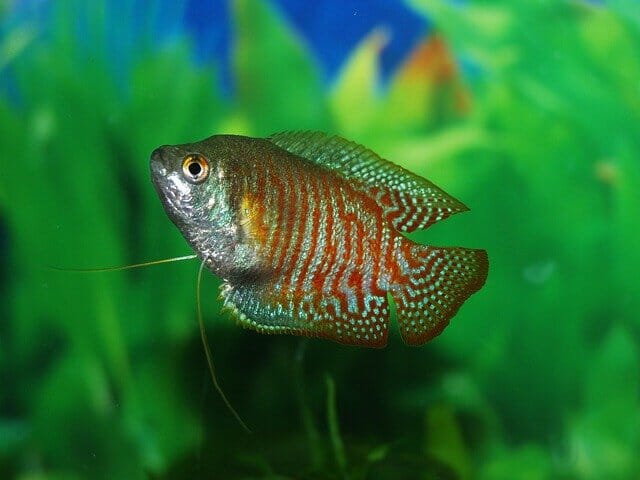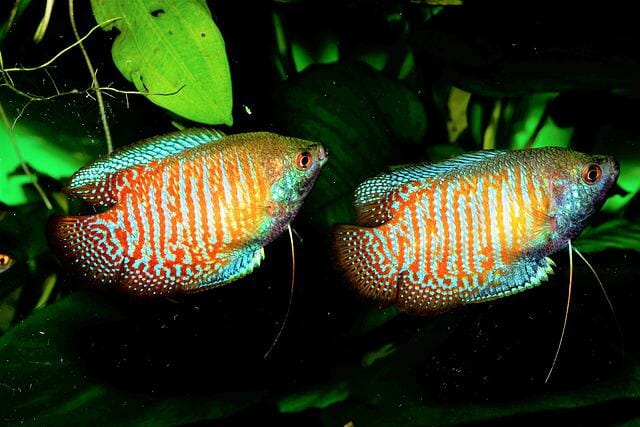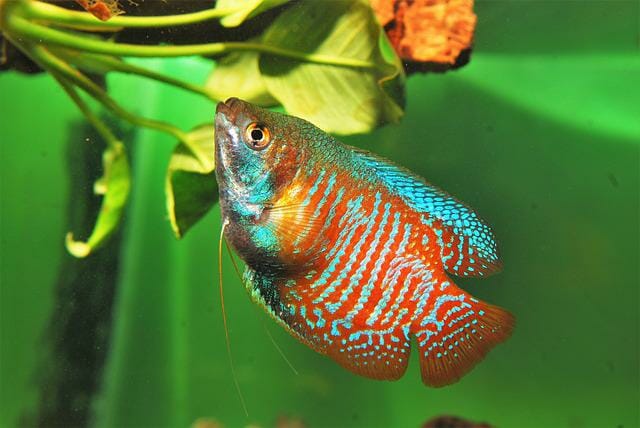Are Dwarf Gouramis Aggressive: Causes, Indicators, and Prevention

Dwarf gouramis can be pretty territorial and may become aggressive when feeling threatened. Additionally, they may attack other fish if they feel they are taking advantage of their territory. So, if you want to keep dwarf gourami, give it plenty of space and avoid provoking the fish.
Table of Contents
Are Dwarf Gouramis Aggressive With Other Fish?
Dwarf gouramis can be territorial and may become aggressive when they feel threatened, but they will not attack other fish in a community setting.
However, it’s important to remember that these fish can be territorial, so they may react negatively if they feel threatened. Therefore, it would be best to keep your dwarf gourami separate from your betta tank or watch out for possible aggression.
Do Dwarf Gouramis Fight Each Other?
Dwarf gouramis are not known for their rivalry instincts, so they will not typically fight with each other. However, if one dwarf gourami feels threatened or asserts its territory, it may react defensively by biting or chasing the other fish.
The Most Common Causes of Dwarf Gourami Aggression
Some potential causes of aggression could include poor water quality, inadequate tank size, and other members of the fish community taking advantage of the dwarf gourami’s resources.
Food
One common cause of aggression in dwarf gouramis is food. Feeding your fish significantly more than they can eat in a day may result in aggressive behavior as the dwarf gourami tries to protect its food supply.
Additionally, if other fish in the tank takes advantage of the dwarf gourami’s resources (such as eating its food), this could lead to aggression.
Mating
Another potential trigger of aggression could be mating. Female dwarf gouramis may become territorial in the early breeding stages, so they may react defensively if their territory is infringed upon.
In addition, spawning may cause the water to become murky so that the dwarf gourami may feel threatened by other fish in the tank.
Environmental Changes
Changes in environmental conditions, such as a rise in water temperature or change in substrate, can also lead to aggression in dwarf gouramis. For example, if there is an increase in dissolved oxygen levels, then this could stimulate aggressive behavior as competing fish try to compete for space and resources.
Additionally, if the dwarf gourami’s tank is moved to a new home, it may react defensively by becoming aggressive toward other fish in the new tank.
Territory
Dwarf gouramis are commonly territorial, so they may become aggressive if their territory is infringed upon. For example, if another fish is added to the tank without permission, the dwarf gourami may feel threatened and react defensively.
So, if you want to keep dwarf gouramis as pets, it’s essential to ensure that their tank is large enough for them and that they have plenty of space to roam. Additionally, be aware of any environmental changes (such as increases in noise or water temperature) that could trigger aggressive behavior.

The Indicators of Aggression Among Dwarf Gouramis
A few indicators may suggest that dwarf gourami is becoming aggressive. For example, the fish may start to exhibit territorial behavior, or it might start to chase other tankmates aggressively. If you see any of these signs, it’s essential to take action and get your pet diagnosed by a vet.
Chasing as a Sign of Aggression
This is one of the most common signs that dwarf gourami is becoming aggressive. For example, if you see your dwarf gourami chasing other fish around the tank, it may be a sign that they’re feeling territorial.
But, as mentioned earlier, dwarf gouramis are generally peaceful fish. So if they exhibit this behavior, it’s essential to get them checked out by a vet as soon as possible.
Exhibiting Territorial Behavior
Another indicator of aggression in dwarf gouramis is when they establish their territory within the tank. For example, the fish may start to build barriers around its territory using rocks, aquatic plants, or even other fish.
Stealing Food
Another sign that dwarf gourami is becoming aggressive is when they start to steal food from other tankmates. For example, the fish may begin to snatch food from other fish or even crabs. If you notice this, you must take action and get your pet diagnosed by a vet as soon as possible.
Breeding
Lastly, one of the indicators that dwarf gourami may be becoming aggressive is when they start to breed. Dwarf gouramis generally don’t need much space, so if you see them starting to breed, it might indicate that their tank environment isn’t ideal.
Wounds
If you notice any wounds on your dwarf gourami, it might be a sign that they’re becoming aggressive. Dwarf gouramis are generally docile fish, and so when they start to exhibit aggressive behavior, it usually means that something is wrong.
How Can You Stop Dwarf Gourami Fish From Acting Aggressive?
If you notice that your dwarf gourami is becoming aggressive, the best thing to do is to get them checked out by a vet as soon as possible. It may jeopardize their health if they have wounds or display other signs of aggression.
Remove Aggressors
One of the best ways to stop your dwarf gourami from becoming aggressive is to remove any potential aggressors from their tank. For example, if another fish is causing problems, try swapping them for a different tank-mate.
Initial fights
In the initial stages of a dwarf gourami’s aggression, they may start to fight with other tank mates. If this happens, separating them and providing them with more space is essential. Over time, as they settle into their new home, these fights will gradually cease.
Decorations
Another possible contributor to dwarf gourami aggression is when they’re kept in an environment that’s too cluttered or contains insufficient decor. Removing unnecessary items and adding more plants and rocks can help create a more calm and peaceful tank for your pet.
Plants
One of the best things you can do to help ease dwarf gourami aggression is to add plenty of plants to their tank. Providing them with lots of enrichment will make them less likely to resort to aggression to survive.
Tank Divider
If you’re having trouble preventing dwarf gourami aggression, adding a tank divider may be the answer. By dividing your tank into smaller spaces, you can help to create a more tranquil environment for your fish

.